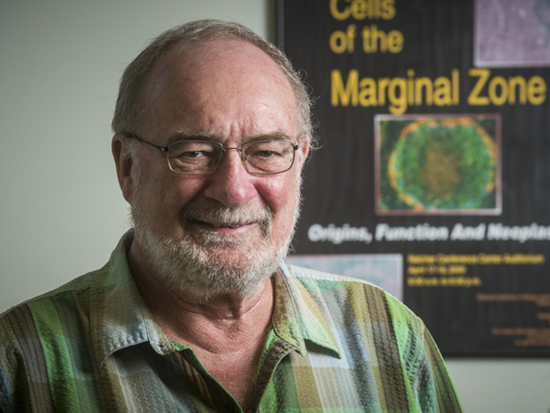 John Kearney, Ph.D.John Kearney, Ph.D., Distinguished Professor of Microbiology at the University of Alabama at Birmingham, has been named a 2023 Distinguished Fellow of the American Association of Immunologists.
John Kearney, Ph.D.John Kearney, Ph.D., Distinguished Professor of Microbiology at the University of Alabama at Birmingham, has been named a 2023 Distinguished Fellow of the American Association of Immunologists.
Kearney, a member of the AAI for 45 years, is one of 19 active, long-term members recognized for their distinguished careers, outstanding scientific contributions, and service to AAI and the immunology community. In 2016, Kearney was named as the AAI-BioLegend Herzenberg Award recipient for his “outstanding research contributions to the field of immunology in the area of B cell biology.”
Three UAB faculty have previously been named as Distinguished Fellows of the AAI, an award that occurs annually and is among the highest honors bestowed by AAI. They are David Chaplin, M.D., Ph.D., in 2020; Judith Kapp, Ph.D., in 2019; and Robert Rich, M.D., in 2019.
Kearney, a native of Orroroo, South Australia, wrote his breakthrough paper, “A New Mouse Myeloma Cell Line that Has Lost Immunoglobulin Expression but Permits the Construction of Antibody-Secreting Cell Lines,” in 1979. This foundational study to help create optimal monoclonal antibodies has been cited more than 2,000 times, according to Google Scholar.
Monoclonal antibodies are valuable in both research and medical treatment. The first therapeutic monoclonal antibodies were commercialized in 1986, and global monoclonal market share is expected to be $209 billion this year.
Kearney did his monoclonal antibody work while on sabbatical in Germany with the noted immunologist Klaus Rajewsky, Ph.D. “As I look back,” Kearney has said of his sabbatical year, “90 percent of what I have done can be traced back to the cell line I developed at the University of Cologne.”
This May will mark his 50th year at UAB, and Kearney has been a full professor in the UAB Department of Microbiology since 1983. In 2013, he presented UAB’s 50th Distinguished Faculty Lecture. The overall research aims of Kearney’s UAB lab are discovering fundamental cellular and molecular mechanisms involved in the development of T and B lymphocytes, the highly specialized defender cells that act in concert to respond to infections.
“Kearney embodies what it means to do research at UAB,” said Carlos Orihuela, Ph.D., interim chair of the Department of Microbiology. “His work has been collegial and high-impact and had real-world consequence on how we treat disease. Kearney is continuing to be an outstanding mentor, and over the span of his near 50 years at UAB, his trainees have excelled and have made their own major contributions. He is a tremendous asset to UAB.”
At UAB, Microbiology is a department in the UAB Marnix E. Heersink School of Medicine.